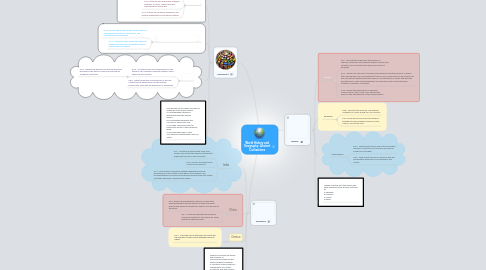
1. Geography
1.1. India
1.1.1. 6.5.1. Locate and describe the major river system and discuss the physical setting that supported the rise of this civilization.
1.1.2. 6.5.2. Discuss the significance of the Aryan invasions.
1.1.3. 6.4.1. Discuss the connections between geography and the development of city-states in the region of the Aegean Sea, including patterns of trade and commerce among Greek city-states and within the wider Mediterranean region.
1.2. China
1.2.1. 6.6.2. Explain the geographic features of China that made governance and the spread of ideas and goods difficult and served to isolate the country from the rest of the world.
1.2.2. 6.6.1. Locate and describe the origins of Chinese civilization in the Huang-He Valley during the Shang Dynasty.
1.3. Greece
1.3.1. 6.4.7. Trace the rise of Alexander the Great and the spread of Greek culture eastward and into Egypt.
1.4. Greece’s mountainous terrain and its series of small islands influenced the ancient Greeks to develop A a political system based on independent city-states. B a culture that was uniform throughout its vast empire. C an economic system based on mining precious metals. D a society completely isolated from other civilizations.
2. Government
2.1. Greece
2.1.1. 6.4.2. Trace the transition from tyranny and oligarchy to early democratic forms of government and back to dictatorship in ancient Greece, including the significance of the invention of the idea of citizenship (e.g., from Pericles' Funeral Oration).
2.1.2. 6.4.3. State the key differences between Athenian, or direct, democracy and representative democracy.
2.1.3. 6.4.5. Outline the founding, expansion, and political organization of the Persian Empire.
2.2. Mesopotamia, Egypt, and Kush
2.2.1. 6.2.8. Identify the location of the Kush civilization and describe its political, commercial, and cultural relations with Egypt.
2.2.2. 6.2.3. Understand the relationship between religion and the social and political order in Mesopotamia and Egypt.
2.3. China
2.3.1. 6.6.5. List the policies and achievements of the emperor Shi Huangdi in unifying northern China under the Qin Dynasty.
2.3.1.1. 6.6.4. Identify the political and cultural problems prevalent in the time of Confucius and how he sought to solve them.
2.3.2. 6.6.6. Detail the political contributions of the Han Dynasty to the development of the imperial bureaucratic state and the expansion of the empire.
2.4. How did the rise to power and reign of Alexander most affect Greece? A He established a peaceful relationship with the Persian Empire. B He strengthened greatly the concept of democratic rule. C He made Macedonia into the intellectual center of the Hellenistic world. D He ended the power of the city-states and established a unifi ed nation.
3. Religion
3.1. Judaism
3.1.1. 6.3.1. Describe the origins and significance of Judaism as the first monotheistic religion based on the concept of one God who sets down moral laws for humanity.
3.1.2. 6.3.2. Identify the sources of the ethical teachings and central beliefs of Judaism (the Hebrew Bible, the Commentaries): belief in God, observance of law, practice of the concepts of righteousness and justice, and importance of study; and describe how the ideas of the Hebrew traditions are reflected in the moral and ethical traditions of Western civilization.
3.1.3. 6.3.3. Explain the significance of Abraham, Moses, Naomi, Ruth, David, and Yohanan ben Zaccai in the development of the Jewish religion.
3.2. Buddhism
3.2.1. 6.6.8. Describe the diffusion of Buddhism northward to China during the Han Dynasty.
3.2.2. 6.5.5. Know the life and moral teachings of Buddha and how Buddhism spread in India, Ceylon, and Central Asia.
3.3. Confucianism
3.3.1. 6.6.4. Identify the political and cultural problems prevalent in the time of Confucius and how he sought to solve them.
3.3.2. 6.6.3. Know about the life of Confucius and the fundamental teachings of Confucianism and Taoism.
